
In life, we often hold certain beliefs and values that shape our perspectives and guide our actions. However, it’s important to recognize that what we believe to be right today may not necessarily remain right forever. Similarly, what we consider wrong today will likely remain wrong throughout time. In this article, we will explore the concept of the fluidity of right and wrong, emphasizing the importance of adaptability, growth, and ethical consistency.
- The Nature of Beliefs:
Beliefs are deeply ingrained ideas and principles that shape our understanding of the world. They are influenced by our upbringing, culture, experiences, and personal values. While beliefs provide us with a moral compass, it’s crucial to remember that they are not set in stone. Our perspectives can evolve as we gain new knowledge and insights. - The Shifting Sands of Truth:
The truth is not a fixed entity but a dynamic concept that evolves with time and discovery. As we learn more about the world and challenge our existing beliefs, our understanding of what is true can change. It’s important to approach truth-seeking with an open mind, ready to question and revise our beliefs based on new evidence and perspectives. - Embracing Change and Growth:
Recognizing that what we believe to be right today may be wrong tomorrow allows us to embrace change and personal growth. It encourages us to challenge our assumptions and engage in ongoing self-reflection. By being open to new ideas and perspectives, we expand our understanding and evolve as individuals. - Consistency in Ethics:
While beliefs can change, certain ethical principles remain constant. Actions that harm others, infringe upon their rights, or lack integrity are universally considered wrong. It’s crucial to maintain ethical consistency even as our beliefs and perspectives evolve. Treating others with respect, fairness, and compassion should always be our guiding principles. - The Role of Humility:
Humility plays a vital role in navigating the fluidity of right and wrong. It requires acknowledging that we don’t have all the answers and being open to learning from others. Humility allows us to admit when we are wrong, make amends, and grow from our mistakes. It fosters a sense of empathy and understanding toward differing viewpoints. - Cultivating a Growth Mindset:
Adopting a growth mindset enables us to embrace change and view challenges as opportunities for learning and personal development. It allows us to adapt our beliefs and perspectives based on new information and experiences. By cultivating a growth mindset, we become more resilient and better equipped to navigate the complexities of right and wrong.
The concept of right and wrong is not fixed, but rather fluid and subject to change. It’s essential to approach our beliefs and values with an open mind, recognizing that what we believe today may evolve over time. While truth and perspectives may shift, certain ethical principles remain constant. By embracing change, cultivating a growth mindset, and maintaining ethical consistency, we can navigate the complexities of right and wrong with humility, adaptability, and a commitment to personal growth.
